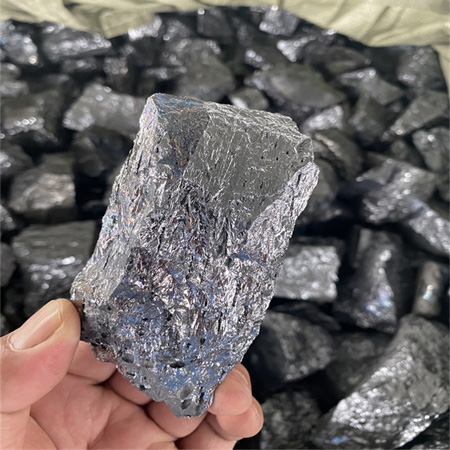Metallurgical Grade Silicon Metal, commonly known as metallurgical silicon or metallurgical-grade silicon (MG-Si), plays a pivotal role in various industrial processes. This article aims to shed light on the importance of metallurgical grade silicon, for instance, its production, and its diverse applications in the metallurgical and manufacturing sectors.
Production Process: Raw materials of Metallurgical Grade Silicon Metal are primarily quartz, one of the Earth’s most abundant minerals. The production process involves the reduction of quartz (silicon dioxide) with carbon in submerged-arc electric furnaces. The reaction produces silicon and carbon monoxide, and the resulting silicon is then refined to meet the certain purity standards. Consequently, the end product is a versatile material with a silicon content typically ranging from 95% to 99.5%.
Silicon Metal for Aluminum Alloy
Industrial Significance: In the aluminum alloy industry, silicon metal is a commonly alloying agent to enhance the properties of aluminum. Different silicon metal models or grades are employed based on the different silicon content in the alloy. Here are some silicon metal models suitable for the aluminum alloy industry:

Si 553: Silicon Content: Approximately 98.5% to 99%
Application: Widely used in the aluminum industry for the production of aluminum-silicon alloys, providing improved fluidity and castability.
Silicon Metal 441: Silicon Content: Around 99%
Application: Used in aluminum alloy production, especially in die-casting applications, due to its high silicon content and excellent performance in improving castability.
Si 421: Silicon Content: Approximately 99.2%
Application: Suitable for aluminum alloys, particularly in the manufacturing of aluminum-silicon alloys for automotive parts and components.
Si 3303: Silicon Content: Typically 98.5% to 99%
Application: Used in aluminum foundries to produce alloys with improved fluidity, helping in the casting process.
Si 2202: Silicon Content: Approximately 99.7%
Application: High-purity silicon metal is important in specific aluminum applications where need extremely low impurity levels.
On the whole, these silicon metal models serve as effective alloying agents in the aluminum industry, contributing to the production of aluminum alloys with enhanced mechanical properties, wear resistance, and corrosion resistance. The selection of a specific model depends on the alloying requirements and the desired properties of the final aluminum alloy product.
In conclusion, Metallurgical Grade Silicon Metal is a versatile and indispensable material with diverse applications across industries. From enhancing the properties of steel alloys to contributing to the growth of the solar energy sector and supporting the production of silicones, MG-Si is a key player in various industrial processes. Therefore, understanding its significance is crucial for professionals in metallurgy, manufacturing, and renewable energy fields.
